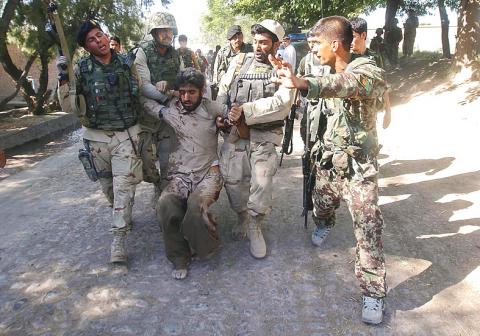Afghan President Hamid Karzai yesterday suspended talks with the US on a new security deal to protest the way his government was being left out of initial peace negotiations with the Taliban meant to find a way to end the nearly 12-year war.
The move by Karzai raises tensions significantly and could derail the peace process even before it has begun.
In a terse statement from his office, Karzai said negotiations with the US on what US and coalition security forces will remain in the country after next year have been put on hold.

Photo: Reuters
The deal was expected to define the future of US troops in Afghanistan and also pave the way for billions in aid to the Afghan economy.
Karzai’s statement followed an announcement on Tuesday by the US and the Taliban that they would pursue bilateral talks in Qatar before the Afghan government was brought in.
“In view of the contradiction between acts and the statements made by the United States of America in regard to the peace process, the Afghan government suspended the negotiations, currently underway in Kabul between Afghan and US delegations on the bilateral security agreement,” Karzai’s statement said.
His spokesman was not immediately reachable for questions, and the US embassy in Kabul said it had no immediate comment.
Though the Taliban have dismissed Karzai as a US puppet for years, they indicated on Tuesday when opening a new political office in Doha, Qatar, that they would be willing to talk with the Afghan leader.
However, both the US side and the Taliban said they would first meet together before any talks with the Afghan government.
In another incident highlighting the fragile situation in Afghanistan, only hours after announcing they would hold talks with the US, the Taliban claimed responsibility yesterday for an attack on the Bagram Air Base in which four US troops were killed.
Taliban spokesman Zabiullah Mujahid said the insurgents fired two rockets into the base outside Kabul late on Tuesday. US officials confirmed the base had come under attack by indirect fire — likely a mortar or rocket — and that four US troops were killed.
Also on Tuesday, five Afghan police officers were killed at a security outpost in Helmand Province by apparent Taliban infiltrators — the latest in a string of so-called “insider attacks” that have shaken the confidence of the nascent Afghan security forces.
The opening of a Taliban political office in Doha with the intention of starting peace talks was a reversal of months of failed efforts to start negotiations while Taliban militants intensified a campaign targeting urban centers and government installations across Afghanistan.
US President Barack Obama said that the peace talks with the Taliban would be neither quick nor easy, but that their opening a political office in Doha was an “important first step toward reconciliation” between the Islamic militants and the government of Afghanistan.
In setting up the office, the Taliban said they were willing to use all legal means to end what they called the occupation of Afghanistan — but did not say they would immediately stop fighting.

The Ministry of the Interior (MOI) is to tighten rules for candidates running for public office, requiring them to declare that they do not hold a Chinese household registration or passport, and that they possess no other foreign citizenship. The requirement was set out in a draft amendment to the Enforcement Rules of the Public Officials Election and Recall Act (公職人員選舉罷免法 ) released by the ministry on Thursday. Under the proposal, candidates would need to make the declaration when submitting their registration forms, which would be published in the official election bulletin. The move follows the removal of several elected officials who were

The Republic of China (ROC) is celebrating its 114th Double Ten National Day today, featuring military parades and a variety of performances and speeches in front of the Presidential Office in Taipei. The Taiwan Taiko Association opened the celebrations with a 100-drummer performance, including young percussionists. As per tradition, an air force Mirage 2000 fighter jet flew over the Presidential Office as a part of the performance. The Honor Guards of the ROC and its marching band also heralded in a military parade. Students from Taichung's Shin Min High School then followed with a colorful performance using floral imagery to represent Taiwan's alternate name

FOUR DESIGNATED AREAS: Notices were issued for live-fire exercises in waters south and northwest of Penghu, northeast of Keelung and west of Kaohsiung, they said The military is planning three major annual exercises across the army, navy and air force this month, with the navy’s “Hai Chiang” (海強, “Sea Strong”) drills running from today through Thursday, the Ministry of National Defense said yesterday. The Hai Chiang exercise, which is to take place in waters surrounding Taiwan, would feature P-3C Orion maritime patrol aircraft and S-70C anti-submarine helicopters, the ministry said, adding that the drills aim to bolster the nation’s offshore defensive capabilities. China has intensified military and psychological pressure against Taiwan, repeatedly sending warplanes and vessels into areas near the nation’s air defense identification zone and across

A Chinese takeover of Taiwan would severely threaten the national security of the US, Japan, the Philippines and other nations, while global economic losses could reach US$10 trillion, National Security Council Deputy Secretary-General Lin Fei-fan (林飛帆) wrote in an article published yesterday in Foreign Affairs. “The future of Taiwan is not merely a regional concern; it is a test of whether the international order can withstand the pressure of authoritarian expansionism,” Lin wrote in the article titled “Taiwan’s Plan for Peace Through Strength — How Investments in Resilience Can Deter Beijing.” Chinese President Xi Jinping’s (習近平) intent to take Taiwan by force